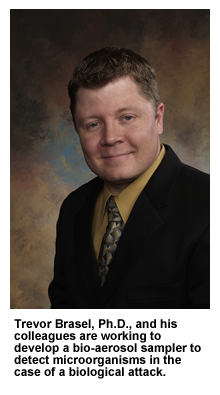Alumni Highlights
Research Now and Research Then
If you�ve ever wondered what to do in case of a biological attack, the answer is simple. Just call former Texas Tech University Health Sciences Center student Trevor Brasel, Ph.D.
 Brasel works for the Lovelace Respiratory Research Institute in Albuquerque, N.M. His current research effort is a collaboration between the Institute and the International Sciences and Technology Center. Brasel and his colleagues are working to develop a personal bio-aerosol sampler for the rapid collection and detection of potential threat microorganisms in the case of a biological attack. Ultimately, the small sampler may be used by first responders on the site of possible contamination.
Brasel works for the Lovelace Respiratory Research Institute in Albuquerque, N.M. His current research effort is a collaboration between the Institute and the International Sciences and Technology Center. Brasel and his colleagues are working to develop a personal bio-aerosol sampler for the rapid collection and detection of potential threat microorganisms in the case of a biological attack. Ultimately, the small sampler may be used by first responders on the site of possible contamination.
Because the program is a bio-defensive effort between the United States and Russia, Brasel divides his time equally between both countries. The samplers are tested in wind tunnels in an attempt to simulate a real threat situation. The scientists test their product using biological simulants, which are microorganisms that closely represent the dangerous contaminants. Testing with simulants, which are not harmful to scientists, offers a safer alternative to the potential dangers associated with substances like anthrax.
Brasel was born in Sioux Falls, S.D., and he grew up in Midland. He had heard that Texas Tech was a good school, and it was close to his family. In 1997, he began his seven and a half years with Tech. In 1998, Brasel was chosen as a Howard Hughes Medical Institute (HHMI) Undergraduate Research Fellow. Funding from the HHMI allows Texas Tech to offer the scholarship and gives recipients the opportunity to perform scientific research during their undergraduate studies. Brasel started his research career with David Straus, Ph.D., at the Texas Tech University Health Sciences Center.
Straus� research focused on the relationship between indoor mold growth and �sick building syndrome,� which sometimes results in illness for those who enter a building that has fungal growth due to water damage. Upon leaving the building, the symptoms usually subside.
Brasel was so intrigued by this research that he decided to continue his education at the Health Sciences Center and chose Straus as his advisor. They continued to research the fungi that grow inside many buildings as a result of excess moisture from floods, pipe leaks, humidity and other sources, as well as the mycotoxins released by some of these fungi, which are what make people sick. Brasel and Straus worked together for about six years.
�One of the most rewarding things about being an adviser for graduate students is that you take a 22-year-old student and watch them grow and mature into a capable scientist,� Straus says.
Brasel was named the Graduate Student of the Year in the Department of Microbiology and Immunology in 2003. He graduated from the Health Sciences Center with a Ph.D. in Medical Microbiology in 2004.
�The Health Sciences Center allowed me to appreciate science and research, and it allowed me to enjoy what I do now,� Brasel says. �I really loved the spirit of Texas Tech.�
